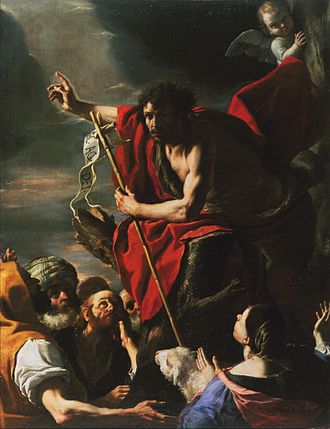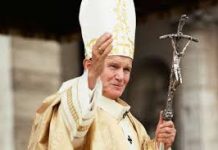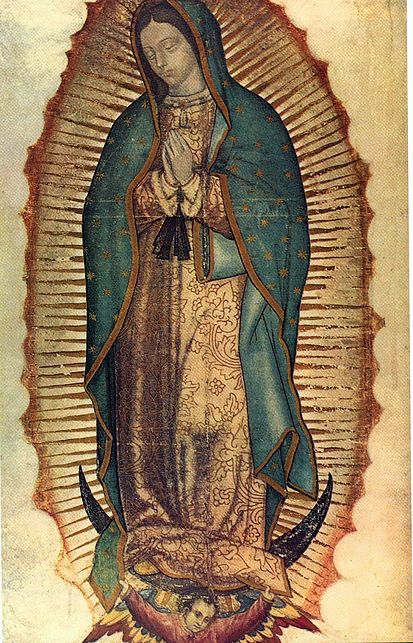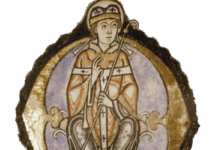The nations shall inquire of him, and his dwelling shall be glorious (Is. 11:10).
The Gospel of the Mass on this second Sunday of Advent introduces us to John the Baptist, the voice of one crying out in the wilderness, ‘Prepare the way of the Lord; make straight His paths’. John the Baptist is one of the three Advent guides who during this time of preparation for Christmas lead us towards our encounter with the living God in Christ. John calls us and all people to repentance; that even the Gentiles might glorify God for His mercy (Rom. 15:9).
We who believe in Christ Our Lord believe that in Him the grace of God has appeared for the salvation of all men, training us to renounce irreligion and worldly passions, and to live sober, upright and godly lives in this world, awaiting the blessed hope, the appearing of the glory of our great God and Saviour Jesus Christ (Tit. 2:11-13). These words from St. Paul’s Epistle to Titus express the whole program of our lives and the importance and necessity of repentance for a godly life. To live with a penitent heart is not a recipe for depression but the source of a constant and fruitful renewal of our nature, always with a view to greater conformity with the life of Our Lord. To repent is to have an unconditional readiness to change in order to be transformed in Christ (Dietricht Von Hildebrand).This is the true and complete meaning of repentance as understood in a religious sense; but it is no less true at the human or natural level. Some may say that they have neither a need nor a desire for change; but life is not static, neither in itself, nor as it is lived. St. John Henry Newman observed that to live is to change, and to be perfect is to have changed often. The call to repentance is a call to transformation in Christ; and this transformation is perfection. For this reason, faith in Christ is the highest form of repentance (St. Cyril of Alexandria).
Our individual and collective effort to live sober, upright and godly lives in this world is the most eloquent proclamation of the Gospel of Our Lord. This is what is sometimes termed the fifth gospel, the gospel lived. St. John the Baptist’s cry to repent, for the kingdom of heaven has come near heralds a new year of grace and of growth in holiness. Is the Baptist’s cry relevant to us? Absolutely, for there is a fundamental human nature that God addresses both through the baptism of John and in the Incarnation of His Son. This nature is wounded; it is wounded by original sin and further weakened by the effects of sins committed and sins suffered. Because it is wounded it needs to be healed and restored; and just as in sickness a cure is most often found outside ourselves, so too in the healing of the human condition, the source of its healing came from without, from God Himself. Repentance prepares us for the gift of the Gospel.
Repentance is a preparation for the gift and peace of the Gospel because repentance effectively addresses the all too common human illusion of moral self-sufficiency and our tendency to substitute ourselves for God. We can find neither salvation nor fulfillment in ourselves. In heeding the call to repentance and faith in Christ Jesus our Saviour, we first divest ourselves of the illusion of self-sufficiency, and we humbly dispose ourselves to new possibilities; to growth in knowledge and love, in truth and in mercy. To repent is to have an unconditional readiness to change in order to be transformed in Christ. This is the true and complete meaning of repentance. When we begin to appreciate what this really means we begin also to understand the uniqueness, beauty and necessity of Christianity.
Repeatedly, the prayers of the Advent Masses beseech God to teach us to judge wisely the things of earth and to hold firm to the things of heaven (Prayer After Communion, Second Sunday of Advent; The Roman Missal); and as we walk amid passing things, [to] teach us by them to love the things of heaven and to hold fast to what endures (Prayer After Communion, First Sunday of Advent; The Roman Missal). These are sober prayers that ask God to make us wise in worldly matters and to live sober, upright and godly lives in this world; as a sign of hope. The Messiah comes to us in grace that we might receive from Him the gift of salvation; so that we ourselves might become a sign of salvation. This is, after all, our task as we walk amid passing things: ‘You are the light of the world. A city set on a hill cannot be hid….Let your light so shine before men, that they may see your good works and give glory to your Father who is in heaven (Mt. 5:14-16).
I am confident of this, that the one who began a good work in you will continue to complete it until the day of Christ Jesus (Phil. 1:51). These words of the Apostle Paul give direction to our lives and also express the confidence and hope of Holy Mother Church as we begin a new year of grace and prepare to celebrate anew the Feast of Christmas. Everything we do in this life, the good we do, and even the suffering we endure; everything is at the service of the work that God has begun in us and given to us. It may be said that through the mysteries of our own earthly life, we change, and because of our faith in Christ Jesus, we become more mature, sober and godly; and so the work of salvation continues, and in and through us the offer of salvation is extended to others. This most certainly is the best gift that we can give to others this Christmas. May the call to repentance inspire us to open our hearts anew to the Mystery of Christ; that we might be transformed in Christ. +











